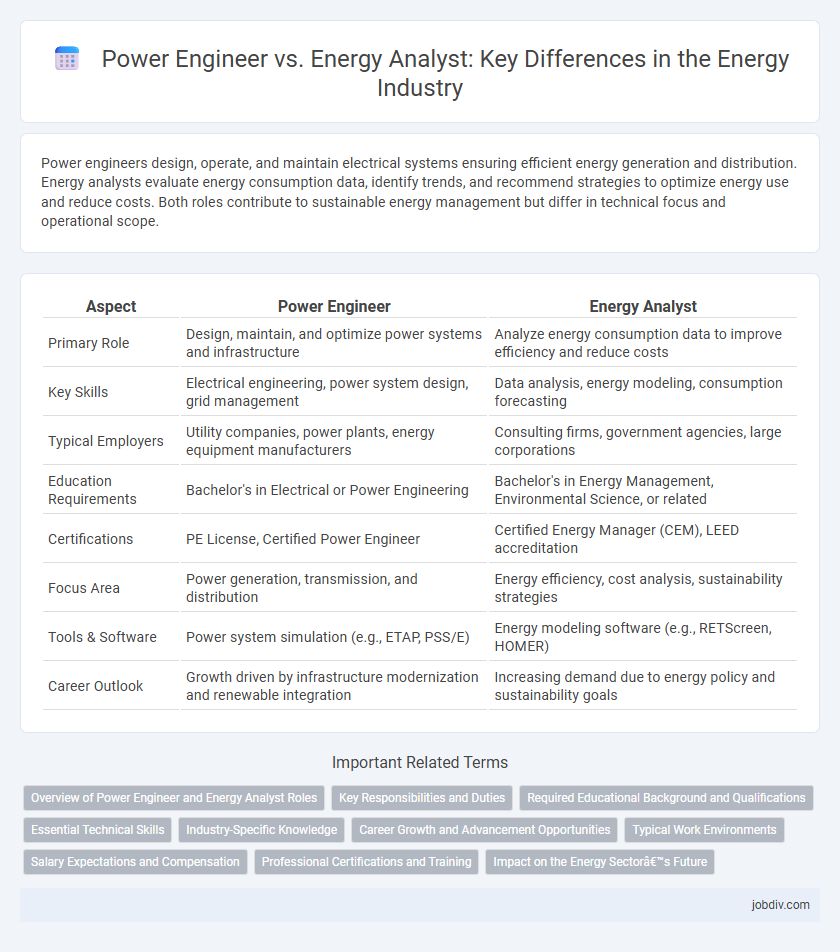Power engineers design, operate, and maintain electrical systems ensuring efficient energy generation and distribution. Energy analysts evaluate energy consumption data, identify trends, and recommend strategies to optimize energy use and reduce costs. Both roles contribute to sustainable energy management but differ in technical focus and operational scope.
Table of Comparison
| Aspect | Power Engineer | Energy Analyst |
|---|---|---|
| Primary Role | Design, maintain, and optimize power systems and infrastructure | Analyze energy consumption data to improve efficiency and reduce costs |
| Key Skills | Electrical engineering, power system design, grid management | Data analysis, energy modeling, consumption forecasting |
| Typical Employers | Utility companies, power plants, energy equipment manufacturers | Consulting firms, government agencies, large corporations |
| Education Requirements | Bachelor's in Electrical or Power Engineering | Bachelor's in Energy Management, Environmental Science, or related |
| Certifications | PE License, Certified Power Engineer | Certified Energy Manager (CEM), LEED accreditation |
| Focus Area | Power generation, transmission, and distribution | Energy efficiency, cost analysis, sustainability strategies |
| Tools & Software | Power system simulation (e.g., ETAP, PSS/E) | Energy modeling software (e.g., RETScreen, HOMER) |
| Career Outlook | Growth driven by infrastructure modernization and renewable integration | Increasing demand due to energy policy and sustainability goals |
Overview of Power Engineer and Energy Analyst Roles
Power Engineers specialize in designing, maintaining, and optimizing electrical power systems to ensure safe and reliable energy distribution. Energy Analysts focus on evaluating energy consumption data, forecasting demand, and identifying efficiency improvements to reduce costs and environmental impact. Both roles are critical in integrating sustainable energy solutions within industrial and commercial sectors.
Key Responsibilities and Duties
Power Engineers design, operate, and maintain electrical power systems ensuring safe and efficient energy generation and distribution, while managing equipment performance and compliance with regulatory standards. Energy Analysts evaluate energy consumption patterns, develop strategies for energy optimization, analyze market trends, and provide data-driven recommendations to reduce costs and enhance sustainability. Both roles require strong analytical skills and technical expertise but focus respectively on system operation versus data interpretation and strategic energy management.
Required Educational Background and Qualifications
Power Engineers typically require a degree in electrical or power engineering with certifications such as Professional Engineer (PE) licensure for high-voltage system design and operation. Energy Analysts usually hold degrees in energy management, environmental science, or data analytics, emphasizing skills in energy modeling, market analysis, and sustainability assessment. Both roles demand proficiency in industry standards and software tools, but Power Engineers focus more on technical engineering credentials while Energy Analysts prioritize analytical and regulatory knowledge.
Essential Technical Skills
Power Engineers possess essential technical skills in electrical system design, load forecasting, and power plant operations, enabling them to manage and optimize energy production. Energy Analysts specialize in data analysis, energy modeling, and market trend evaluation to improve energy efficiency and inform strategic decision-making. Both roles require strong proficiency in energy management software and regulatory compliance knowledge to address industry challenges effectively.
Industry-Specific Knowledge
Power Engineers possess in-depth expertise in electrical systems, grid operation, and infrastructure design within power generation and distribution industries. Energy Analysts specialize in evaluating energy consumption patterns, conducting cost-benefit analyses, and forecasting demand across various sectors including renewables, utilities, and manufacturing. Industry-specific knowledge for Power Engineers revolves around system reliability and compliance standards, whereas Energy Analysts emphasize data analytics and policy impact assessment in energy markets.
Career Growth and Advancement Opportunities
Power Engineers typically advance through technical certifications and leadership roles in infrastructure management, gaining expertise in systems optimization and compliance. Energy Analysts experience career growth by leveraging data analytics and market forecasting skills to influence strategic decisions and policy developments. Both careers offer growth through specialization, with Power Engineers focusing on operational reliability and Energy Analysts on sustainability trends and financial modeling.
Typical Work Environments
Power engineers typically work in industrial plants, power generation facilities, and electrical utilities where they manage and maintain electrical systems to ensure reliable energy supply. Energy analysts are often based in corporate offices, consulting firms, or government agencies, analyzing energy consumption data and developing strategies for efficiency and sustainability. Both roles may collaborate in project sites, but power engineers are more hands-on with operational equipment while energy analysts focus on data-driven decision making.
Salary Expectations and Compensation
Power Engineers typically earn higher salaries than Energy Analysts due to their specialized technical expertise in power generation and distribution systems, with average salaries ranging from $80,000 to $120,000 annually. Energy Analysts usually have salaries between $60,000 and $90,000, reflecting their focus on data analysis, market trends, and energy efficiency strategies. Compensation packages for Power Engineers often include bonuses and overtime pay, while Energy Analysts benefit from performance-based incentives and flexible working arrangements.
Professional Certifications and Training
Power engineers typically hold certifications such as the Professional Engineering (PE) license with a specialization in power systems, alongside training in electrical power generation, transmission, and distribution. Energy analysts often pursue credentials like the Certified Energy Manager (CEM) or LEED accreditation, emphasizing energy efficiency, data analysis, and sustainability practices. Both roles require continuous education, with power engineers focusing on technical and regulatory standards, while energy analysts specialize in energy market trends and resource optimization.
Impact on the Energy Sector’s Future
Power engineers design and maintain energy systems critical for generating and distributing electricity, ensuring reliability and efficiency at the infrastructure level. Energy analysts evaluate market trends, policy impacts, and consumption data to optimize energy use and support sustainable practices. Together, their expertise drives innovation and strategic planning essential for advancing the energy sector's transition to renewable resources and smart grid technologies.
Power Engineer vs Energy Analyst Infographic

 jobdiv.com
jobdiv.com